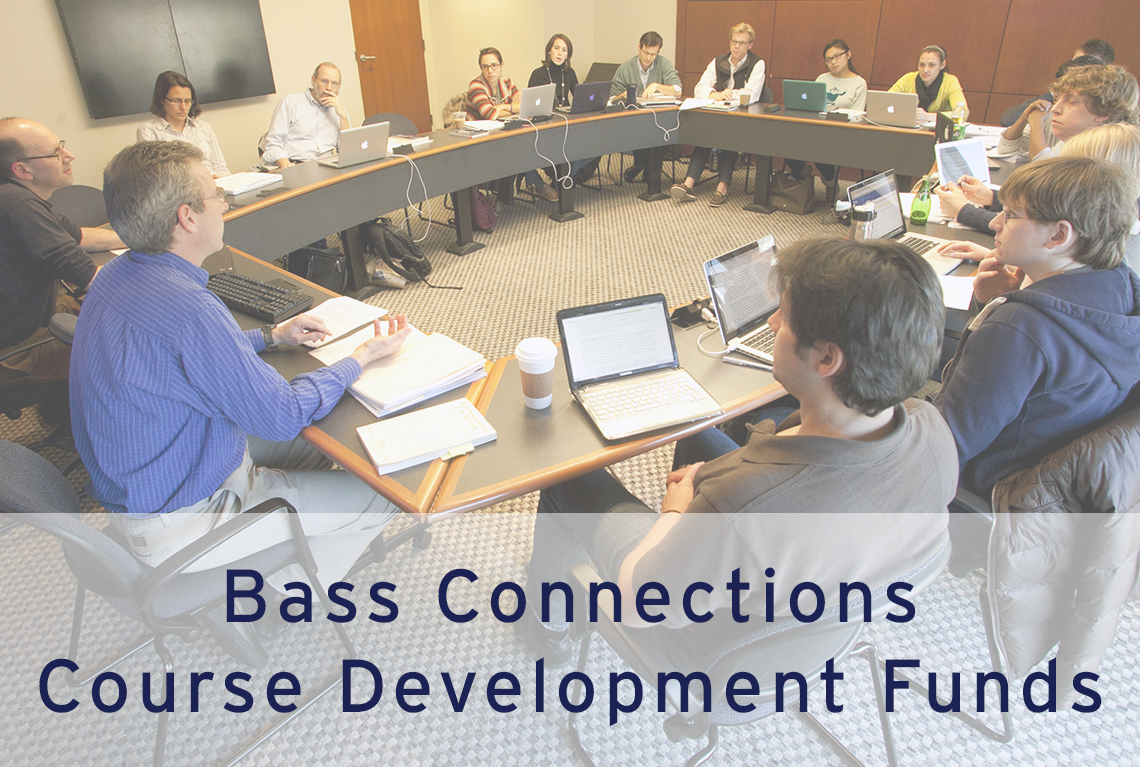Request for Proposals: Bass Connections Offers Course Development Funds
January 17, 2017

Opportunity
Bass Connections brings together faculty and students—from all levels and schools—in interdisciplinary research teams. Faculty, graduate and professional students, undergraduates and postdocs apply their skills and perspectives to generate creative solutions to complex problems in five theme areas.
In addition to more than 40 project teams each year, Bass Connections offers curricular pathways in each theme to complement a student’s major or program of study.
To augment efforts the themes are already undertaking to build out curricular pathways, Bass Connections has funds available centrally to support courses that will enrich the pathways of Bass Connections.
Course development funds are available for faculty, departments or schools to organize new or modify existing courses following the model of Bass Connections. Such courses should contain at least two of the three “connections”:
- Multidisciplinary
- Multilevel participation (could be an upper-level combined undergraduate/graduate course or an undergraduate course with a graduate TA and sustained mentoring between graduate and undergraduate students)
- Asking questions of societal importance.
A course could have a Bass Connections-like project embedded into it, or incorporate other team-based activities or projects.
We anticipate awarding funds for at least two courses. Proposals could be for an individual course or a pair of coordinated courses across two departments (e.g., a pair of energy-inflected courses in both Political Science and Cultural Anthropology). Courses should be proposed at a topic level that is broader than one specific project team. For reference, see previous awardees and course descriptions.
Awards will include funds for teaching replacement and TAs, as applicable, to facilitate initial offering of the course, and may be used throughout the 2017-2018 academic year, or through the initial offering of the course.
For modifying existing courses, if the course is successful, the organizing faculty will be expected to commit to offering the course on a regular basis, at least three times in the subsequent five-year period. New courses may be more experimental in nature (e.g., special topics), and so may not be able to be offered on a regular basis. Proposers do not need to have previously participated in Bass Connections.
Eligibility
All regular-rank faculty, including in professional schools and institutes, may propose courses, and may also involve faculty of any other ranks in the course (including non-regular rank or visiting faculty), as appropriate.
Proposals
Course proposals should be submitted to Hallie Knuffman in Bass Connections by Friday, March 3 at 5:00 p.m. and should include:
- A brief narrative that articulates the goals of the course, how it fits with the Bass Connections model (e.g., interdisciplinary course content, visiting faculty, collaborative project-based assignments), the faculty’s unique position and qualifications for leading it and a plan for offering the course (no more than 3 pages)
- A draft syllabus or outline of the course
- A 2-page CV for each faculty leader
- A budget plan (up to $5,000) and timeline for use of the funds
- A letter or e-mail from the faculty’s chair (for faculty in Trinity, Medicine or Pratt), dean (for faculty in Sanford, Law, Fuqua, Divinity, Nicholas or Nursing), or director (for university-wide institutes and initiatives) in support of the course proposal, including the promise of the faculty’s availability to teach the course if funded.
Review and Selection
Proposals will be reviewed by the Bass Connections theme leaders and the Vice Provost for Interdisciplinary Studies. Decisions will be announced by early April 2017, and funds will be awarded as appropriate to the initial offering of the course.
Awardees will be expected to provide updates on their progress during the year, which may include meeting with the Vice Provost for Interdisciplinary Studies or other Bass Connections leadership.
Questions?
Please contact Hallie Knuffman, hallie.knuffman@duke.edu, (919) 613-9921.
